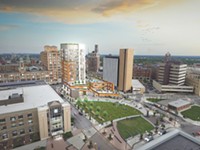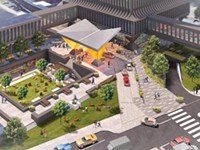[
{
"name": "500x250 Ad",
"insertPoint": "5",
"component": "15667920",
"parentWrapperClass": "",
"requiredCountToDisplay": "1"
}
]
It's important to know what Rochester stands to gain from a possible downtown casino, as well as what it stands to lose, says former mayor Bill Johnson. A big downside is the loss of any kind of say-so in the fate of a prime downtown property, forever, if the land becomes sovereign territory belonging to the Seneca Nation of Indians.
The City of Rochester and the Seneca Nation are reportedly discussing a combined casino-performing arts center on a city-owned parcel on East Main Street at Midtown. Local media report that the casino and theater would be in a four- or five-story building on the Midtown land with the casino on the lower floors and the theater on top. Both would be owned and operated by the Senecas.
Actually, "casino" may be too strong a word for what Rochester is likely to get. The Seneca Nation has already maxed-out the number of full-fledged casinos it is allowed under its compact with the state. Rochester would get a Class II gaming facility, which essentially means video gaming terminals and video slots; no table games of any kind. Forget Las Vegas.
On the "gain" side, there's the money from the sale of the Midtown parcel to the Senecas. The casino would also create jobs, and Rochester would finally get its long-sought-after downtown performing arts center, with the Senecas picking up the check on the whole thing.
But casinos have a spotty record when it comes to revitalization. The city would also lose potential property tax revenue because the land would be exempt, and the casino could have a corrosive effect on the population. And then there's the sovereignty issue: the former Midtown parcel would forever be under the control of the Seneca Nation.
"It's literally another nation, and they're responsible for their own affairs," says Daniel Spitzer, a Buffalo attorney who was involved in discussions about a possible Henrietta casino in 2014. "The Native-American nations take their sovereignty rights extremely seriously."
The Midtown property is valuable land smack in the middle of a downtown that is hot with housing projects. Just because developers haven't shown interest yet in the potential casino parcel, doesn't mean that they won't in the near future, Johnson says. The city would lose that opportunity if it takes the Seneca deal, he says.
The Senecas can't simply declare the Midtown property sovereign land; ownership and sovereignty are unrelated. The nation would buy the land and then ask the US Department of the Interior to make it sovereign; sources that CITY consulted differed on whether Congressional approval is needed, too.
The City of Rochester, as the host municipality, would likely have a chance to comment on the sovereignty petition, and to raise objections.
No compact is required in Rochester's case because the state is not permitted to regulate Class II gaming, according to the State Gaming Commission. But no compact probably also means no guaranteed revenue-sharing for the city; the Senecas have agreements with the host municipalities of their three full-fledged casinos in Western New York to make up for the loss of property tax revenue.
However, the City of Rochester may be able to negotiate a revenue-sharing deal with the Senecas during the sale of the land, experts say.
That would also be the time for the city to negotiate job-creation requirements, the use of women- and minority-owned businesses, and any other conditions it wants.
The Senecas would likely have informal agreements with the Rochester Police Department and the Rochester Fire Department for emergency services. Buffalo fire and Buffalo police respond to the Seneca Buffalo Creek Casino, for example, which experts say is a good comparison for Rochester as it's located in an urban center.
The Seneca Nation does its own code enforcement — it has its own building codes which mirror the state's — and would not require the City of Rochester's approval to make modifications or improvements to its facility.
"You wouldn't have a Native-American project go before a zoning board," says Spitzer, the Buffalo attorney.
But the nation understands that it's in its best interest to involve the municipality and the community, experts say.
The sovereignty would also likely apply to the performing arts center. The Department of the Interior has said that the state can't force Native Americans to give up elements of sovereignty that aren't directly related to gambling, although that's not always an easy distinction to make, says Errol Meidinger, a professor of law at SUNY Buffalo Law School.
And much of the legal action involving the nation, such as a contract dispute with a vendor, for example, would likely take place in the Seneca Nation's courts and not the state court system.
"The Senecas have a series of courts called the Peacemaker Courts: a very sophisticated tribal court system," Spitzer says.
Criminal matters, however, would be handled by local authorities and state courts, experts say.
The Midtown property would in all likelihood remain sovereign territory forever, even if the casino fails. In which case, the Senecas would undoubtedly find another use for the land, experts say, rather than sell it; Native Americans have a long history of trying to reclaim what they feel are their ancestral lands and are highly unlikely to cut loose sovereign territory, they say.
Former mayor Johnson says that it's too early to comment on the Seneca deal because no proposal has been put forth, although he says that if the Senecas are serious, that he expects a proposal to come sooner rather than later.
"We don't know what this deal is, what the city would get," he says. "We know what the mayor really craves, and that is a performing arts center. And unfortunately, nobody's come along yet to offer to build just a performing arts center."
But Johnson says that whatever deal comes along must be closely scrutinized. Rochester should look to Seneca Buffalo Creek Casino to see how sovereignty is playing out there and what rights the city has on sovereign tribal land.
Spitzer agrees.
"When we say they're other nations, we're not kidding," he says. "They really are other nations. And that's what people have to understand about letting in Indian casinos; you're letting another nation take over part of your city. It's not your city anymore. It's no longer your place to determine the future of that land."
Speaking of...
Latest in News
More by Christine Carrie Fien
-

Building up
Mar 29, 2017 -

Hetsko's heart
Mar 15, 2017 -

Squeezing starts at GateHouse-owned Daily Record and RBJ
Feb 28, 2017 - More »









